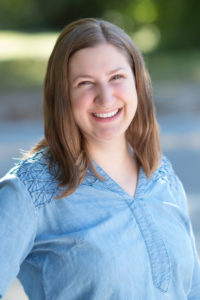50 Stories for 50 Years: Hannah Ennis
 Have you ever had an incident stick in your mind so sharply that it alters how you see your career? Hannah Ennis, United Ministries’ Student Resource Specialist, had such a moment. Before joining United Ministries’ team, she was on a mission trip in Louisiana. There, her group walked past and largely ignored an older, untidy-looking woman. The group was then told by their guide that the woman looked like she needed a bit of help carrying her items, so Hannah volunteered to go back to help the woman. When Hannah walked back, the woman looked up and said, “I knew it would be you who came back. You’re the only one who said hello to me.”
Have you ever had an incident stick in your mind so sharply that it alters how you see your career? Hannah Ennis, United Ministries’ Student Resource Specialist, had such a moment. Before joining United Ministries’ team, she was on a mission trip in Louisiana. There, her group walked past and largely ignored an older, untidy-looking woman. The group was then told by their guide that the woman looked like she needed a bit of help carrying her items, so Hannah volunteered to go back to help the woman. When Hannah walked back, the woman looked up and said, “I knew it would be you who came back. You’re the only one who said hello to me.”
Hannah grew up going to Buncombe St. Church, a partner of United Ministries, so she was already familiar with the mission of the work done here. However, the encounter with the woman stuck with her and made her take a hard look at the “us versus them” attitude that is often associated with people who are homeless, which now impacts how she interacts with participants here. During her initial interview for United Ministries, she expressed that she didn’t know the exact role she wanted, but she knew that she “wanted to be someone people could come back to and say, ‘Hannah can help me.’”
She joined the United Ministries family seven years ago and first worked as a counselor in the Adult Education program before moving to the role of Employment Counselor, which she was in for three years. These two positions helped her gain perspective for her current role as Student Resource Specialist, which has her in the Adult Education program again. This position, which is relatively new to United Ministries, has two main focuses: connect students to the community while triaging their needs and assist participants in advocating for themselves. There are many resources a student may need help being to be connected to, such as childcare and transportation. Helping participants advocate for themselves can also take many forms and is usually much more individualized. “It can be helping a student set an alarm on their phone or checking their voicemail,” Hannah explains. Before Hannah helped create this role, Adult Education students often did not have enough access to case management. Now, Hannah is available for students who may have extra barriers to face while they work to obtain their GEDs.
Hannah’s position does not exist without its challenges. As the person offering case management in the Adult Education program, she clearly sees what resources are lacking in Greenville. It’s frustrating for her and the student she is trying to help if, for example, the student needs affordable and quality childcare in order to study for their GED, but that resource is not available. Although she works to get her participants the help they need, Hannah sometimes must recognize that it’s not possible at that moment. She has also struggled at times with walking the line between helping a student recognize their goals and allowing that student to figure things out themselves. She wants to be a supportive figure in their education journey, but not dictate what that journey will look like. Being aware of these challenges has helped Hannah build relationships with participants, since self-awareness allows her to be sincere. Even though many students stop coming to United Ministries after they obtain their GED, many reach back out to give Hannah updates on their lives, which is one of her favorite parts of the job. It is clear from how she talks about her students that Hannah is invested in every one of them and United Ministries is lucky to have her expertise and commitment!
